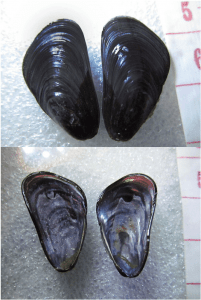Invasive mussel in Kerala’s backwaters
What are invasive species?
- An invasive species can be any kind of living organism—an amphibian, plant, insect, fish, fungus, or bacteria—that is not native to an ecosystem and causes harm.
- Not all non-native species are invasive. For example, most of the food crops grown in India, including onion, potato and tomatoes are not native to the region.
- To be invasive,
- a species must adapt to the new area easily
- it must reproduce quickly
- it must harm the economy, or the native plants and animals of the region
- Some of the most serious invasive species in India are Alternanthera philoxeroides, Cassia uniflora, Chromolaena odorata, Eichhornia crassipes, Lantana camara, Parthenium hysterophorus and Prosopis juliflora, etc.
Cyclone Ockhi
- The cyclone ockhi hit India and Sri lanka in 2017.
Mussels
- Mussel is the common name used for members of several families of bivalve (2 shell) molluscs, from saltwater and freshwater habitats.
- These groups have in common a shell whose outline is elongated and asymmetrical compared with other edible clams, which are often more or less rounded or oval.
Charru Mussels
- Mytella charruana is commonly known as the Charru Mussel. It is an invasive species.
- It is native to the tropical Western Atlantic from Colon, Panama to Argentina
 .
.- It is found on oyster beds, shells, wood, and roots, but adult mussels are most common on man-made substrates, such as docks and power plants.
- This mussel can tolerate a wide range of salinities, but its tolerance of low temperatures is limited.
Ashtamudi Lake
- Ashtamudi wetland is an estuary, which lies in the Kollam district of Kerala.
- The Kallada river which originates from the western ghats, traverses through virgin forests and finally falls into the Ashtamudi wetland, after traveling a distance of about 120 km.
- About 40 species of wetland dependent birds are noted in Ashtamudi Lake, out of which 45% are long distance migrants.
Why in the news?
- According to a paper published in the Journal of Aquatic Biology and Fisheries, Charru Mussel has spread across the backwaters of Kerala after Cyclone Ockhi.
- Ashtamudi Lake remains the worst hit by this invasive species. With a population as high as 11,384 per sq metre here, the Charru Musssels has replaced the Asian green mussel (Perna viridis) and the edible oyster Magallana bilineata (known locally as muringa).

[…] https://officerspulse.com/invasive-mussel-in-keralas-backwaters/ […]